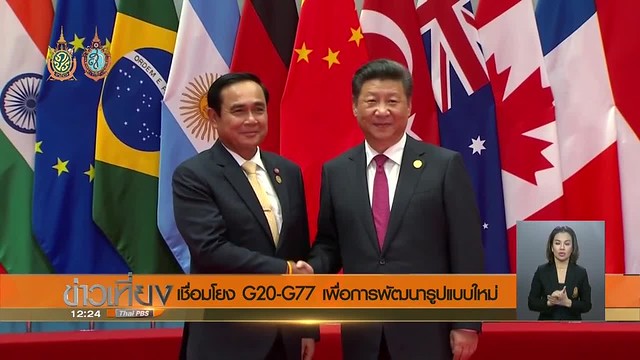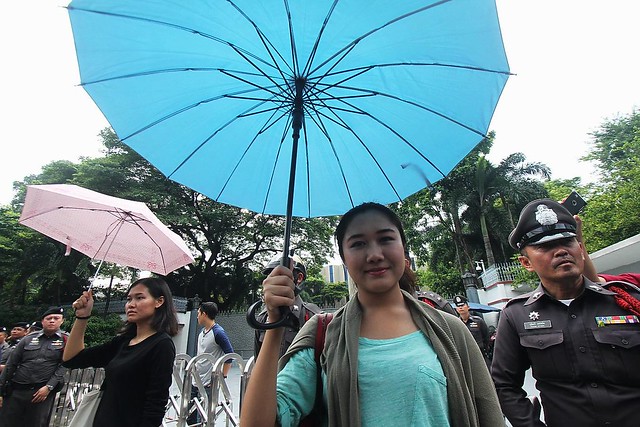Despite the junta’s nationalistic rhetoric, the deportation of Joshua Wong has sparked debate over Thailand’s sovereignty and foreign policy as the regime appears increasingly eager to please Beijing.
On 5 October 2016, Joshua Wong, a student activist who became a global icon for the fight for democracy in Hong Kong, made headlines in global media once again after Thailand’s immigration barred him from entering the country and detained him for some 12 hours at the request of the Chinese government. He was eventually deported back to Hong Kong.

Joshua Wong Chi-fung, a key leader of Hong Kong’s Umbrella Movement and secretary general of the Demosistō political party (Photo from Wikipedia)
Wong had been invited to the Faculty of Political Science at Chulalongkorn University to give a talk on youth politics at an event commemorating the 40th anniversary of Thailand’s 6 October 1976 massacre.
Gen Prayut Chan-o-cha, the Thai junta leader and Prime Minister, subsequently alleged that, “He just flew over. He’s gone to China already.”
According to to the Thai immigration bureau, his entry was blocked on the basis of Article 12(7) of the 1979 Immigration Act, which states that anyone constituting a threat to national security or who is listed under arrest warrants issued by foreign governments should be prohibited from entering the kingdom.
Thai and Hong Kong activists swiftly condemned Thai authorities for Wong’s deportation. The New Democracy Movement (NDM), an anti-junta activist group, held a protest in front of the Chinese Embassy in Bangkok shaming both the Thai and Chinese government. In Hong Kong, a similar rally was held by Wong’s supporters in front of the Thai Consulate.
At a small protest held at Chulalongkorn University in response to the deportation, Netiwit Choltiphatphaisal, a leading pro-democracy student activist, said “Too much intimacy between The government and Chinese government might lead to a lack of academic knowledge [because] we’re only allowed to talk in a certain way....Joshua Wong has rights to be here”.
According to Pongkwan Swasdipakdi, a lecturer on International Relations at Thammasat University, the Joshua Wong case was not surprising since everyone could sense the two countries growing closer.
Yet Wong’s deportation is significant in its demonstration of how the junta’s foreign policy options have been limited by countries unwilling to engage with an undemocratic regime — resulting in its increasing dependence, and unwillingness to challenge, China.

Gen Prayut Chan-o-cha, the Thai junta leader and Prime Minister, with Xi Jinping, the current General Secretary of the Communist Party of China and the President of the People's Republic of China, at the G20 meeting in China in September 2016 (Photo from the Thai PBS)
“[The deportation] implies that Thailand lacks options because it fails to pursue a usual hedging strategy. In other words, Thailand is failing to balance China's rise to power,” said Pongkwan. “It could have been different with the civilian government given that the relationship between Thailand and other major powers, especially the US, deteriorated after the coup. The US has been constrained by her constitution on the issue of giving aid to undemocratic countries. That was partially a reason why the current government has shifted towards China.”
Joining the Thammasat lecturer in mocking the Thai authorities, Decharut Sukkumnoed, a lecturer at Kasetsart University's Faculty of Agricultural Economics, posted a comment on his Facebook account reading, “This is interesting. The Chinese government could not order Hong Kong to stop him from travelling outside the country, but it could order the Thai government to deport Joshua Wong back to China.”
Jason Ng, a Hong Kong author who helped arrange Wong’s trip, also agreed Thailand’s refusal to admit the activist showed “how ready Beijing is to flex its diplomatic muscles and [how it] expects neighbouring governments to play ball”, the Guardian quoted Ng as saying.
But Pongkwan questioned whether the junta’s kowtowing to Beijing’s demands is sustainable.
“It's all about having options. Given that Thailand lacks balancing power and China is one of its biggest trading partners and donors, it's hard to resist China's request. However, this is not purely the consequence of China’s increasing power, but also Thailand’s flawed foreign policy,” the IR lecturer concluded.
In response to Wong’s deportation, Rangsiman Rome, a key NDM leader, wrote on his facebook account, “Thailand does not have to change its position to serve China”. Drawing comparisons to Thailand’s dependency on the US in 1960-1970s, Rome added, “In the present, an old picture of an American colony is replicated, but the colonial power is no longer the US but China.”

Chanoknan Ruamsap and other NDM members gather with umbrellas, symbol of Hong Kong’s pro-democracy 2014 Umbrella Movement led by Wong’s political group, in front of the Chinese Embassy in Bangkok to protest against Wong’s detention and deportation on 5 October 2016
Yet as the Thai junta becomes cozier with China, Wong’s case may be considered fortunate. Since the the 2014 coup d’état, the Thai junta has deported scores of political dissidents who came to Thailand as asylum seekers back to mainland China.
In November 2015, the Thai government arrested Dong Guangping and Jiang Yefei, human rights defenders from China recognised as refugees by the UNHCR. They were later deported back to China reportedly upon Beijing’s request. In October the same year, Gui Minhai, a bookseller from Hong kong selling books critical of the Chinese government, vanished from his house in Pattaya, a famous resort town in eastern Thailand, before reappearing in mainland China under custody.
This is all on top of the deportation of 109 Uighur ethnic minorities in July 2015 at the request of the Chinese government, who claimed that they have committed crimes. The US Department of State and human rights groups condemned Thailand for the deportation.

